Annual Report 2022-2023
The Civilian Review and Complaints Commission for the RCMP (the CRCC) is an agency of the federal government, distinct and independent from the RCMP.
VISION: The CRCC will become the national leader for independent review of policing activities through the provision of a relevant, timely and transparent complaint process.
MISSION: Deliver a robust complaint process which holds the RCMP accountable for its activities and the conduct of its members.
MANDATE: As set out in Parts VI and VII of the Royal Canadian Mounted Police Act, the mandate of the Commission is to:
- receive complaints from the public about the conduct of RCMP members;
- conduct reviews when complainants are not satisfied with the RCMP's handling of their complaints;
- initiate complaints and investigations into RCMP conduct when it is in the public interest to do so;
- review specified RCMP activities;
- report findings and make recommendations; and
- promote public awareness of the complaint process.
STRATEGIC OBJECTIVES
- Strengthening the public complaint process.
- Strengthening the Commission's review and investigative capacity.
- Enhancing relations with provincial and territorial governments, as well as police and federal review bodies.
- Conducting specified activity reviews of RCMP programs, policies and practices.
- Increasing outreach, public education and engagement efforts.
Land Acknowledgement
The CRCC acknowledges that our offices, located in Ottawa and Vancouver, are on the traditional unceded, unsurrendered territory of the Anishinaabe Algonquin People, šxʷməθkʷəy̓əmaɁɬ təməxʷ (Musqueam), Skwxwú7mesh-ulh Temíx̱w (Squamish), səl̓ilwətaɁɬ təməxʷ (Tsleil-Waututh), S'ólh Téméxw (Stó:lō), Stz'uminus, Hul'qumi'num Treaty Group and Coast Salish Nations.
Minister of Public Works and Government Services
Cat. No.: PS75-2
ISSN: 2369-3118
Table of Contents
The Complaint & Review Process
- Service Standards
- Public Complaints
- Reviews of the RCMP's Handling of Public Complaints
- Multiple Complaint Subject Member Project
- Public Education & Outreach
- Heads of Police Oversight Agencies Annual Meeting
- Canadian Association of Civilian Oversight of Law Enforcement
Transparency and Accountability
- Searchable Findings & Recommendations
- Provincial/Territorial Reports on RCMP Public Complaints
- Administration of the Public Complaint Process
- New Intake Policy
Message from the Chairperson

The complexity of law enforcement in Canada has increased over the past decade, with police responding to very different issues, including filling the gaps left by cuts to other social services. At times, these same police officers do not have the appropriate training to respond to these issues, but, in many communities across Canada, they are the only option available.
This increase in complexity has come at a time when police services across Canada are experiencing significant difficulty with both recruiting and retention. Law Enforcement professionals have come under increased scrutiny, with police interactions captured more frequently on video, and subsequently broadcast on social media.
This climate of increased police responsibility, recruiting and retention difficulties, and greater scrutiny of police actions has led to some unique challenges for police and, not surprisingly, police oversight. Police oversight must rise to these challenges, through robust accountability.
However, to be truly relevant and effective, police oversight must go beyond holding individual officers accountable for their actions. The police accountability profile must also focus on systemic issues and seek to bring about change. Oversight can improve policing outcomes for both the public and the police by identifying problems and making recommendations that ultimately lead to better quality training, and improved policies and procedures. This can only be achieved by reviewing policing through both individual and systemic perspectives.
Law enforcement accountability cannot start and end with the actions of individual officers. Law enforcement accountability must include leadership, and ensure that those charged with public safety have all the necessary tools to better serve their communities. Police oversight can and must contribute to this more holistic view of accountability.
The Complaint & Review Process
The Public Complaint Process
The CRCC accepts complaints about the on-duty conduct of RCMP members from individuals:
- Directly involved;
- Who witnessed the conduct itself;
- Authorized to act on behalf of the complainant.
When a complaint is made, typically the CRCC sends the complaint to the RCMP for investigation. The RCMP investigates the complaint and reports back to the complainant.
The Chairperson can also initiate a complaint. These complaints allow the Chairperson to set the scope of the investigation of the complaint. These complaints are typically investigated in the same manner as a complaint from a member of the public.
A complaint must be made within one year of the alleged conduct occurring.
********
Requests to review the RCMP's handling of a public complaint must be made within 60 days of receiving the RCMP's formal response to a complaint.
The Review Process
If an individual is not satisfied with the RCMP's handling of their complaint, they may request that the CRCC conduct a review of the RCMP's investigation.
If the CRCC is satisfied with RCMP's investigation, the Chairperson issues a Satisfied Report, thereby ending the review process.
If the CRCC finds the RCMP did not conduct a thorough investigation, the Chairperson can request that the RCMP investigate further and issue a new report.
If the CRCC is not satisfied with the RCMP's handling of the complaint, the Chairperson will issue an Interim Report, outlining various findings and recommendations directed at the RCMP.
Once the Interim Report has been reviewed by the RCMP, the RCMP Commissioner issues a report to the CRCC identifying which recommendations the RCMP will act on. If no action is to be taken, the RCMP Commissioner must provide reasons.
After receiving the RCMP Commissioner's Response, the Chairperson considers the RCMP's position and prepares a Final Report. This completes the CRCC's review process.
Process Flowchart

Text Version
1. A complaint is made to either:*
- The RCMP
- The Civilian Review and Complaints Commission for the RCMP (CRCC)
- The provincial authority responsible for receiving complaints against police in the province in which the subject of the complaint took place.
2. The RCMP investigates the complaint.
3. The RCMP reports to the Complainant.
4a. If the Complainant is satisfied with the RCMP's report, this is the end of the process.
4b. If the Complainant is not satisfied with the RCMP's report, the Complainant may request a review by the CRCC. The CRCC requests all relevant investigative material from the RCMP.
5a. If the CRCC is satisfied with the RCMP's report, the Chair sends a satisfied report to the RCMP Commissioner, Minister of Public Safety, Complainant and Member(s) involved. This is the end of the process.
5b. If the CRCC is not satisfied with the RCMP's report, the Chair may:
- Review the complaint and all relevant material without further investigation;
- Ask the RCMP to investigate further;
- Initiate a CRCC investigation; or
- Hold a public hearing.
6a. Following its review, if the Commission is satisfied with the RCMP's handling of the complaint, the Chairperson issues a satisfied report to the RCMP Commissioner, Minister of Public Safety, Complainant and Member(s) involved, thereby ending the review process.
6b. If, at the conclusion of the review, the Commission is not satisfied with the RCMP's handling of the complaint, the Chairperson will issue an interim report outlining various findings and recommendations directed at the RCMP, which will be sent to the RCMP Commissioner and the Minister of Public Safety.
7. If an interim report is sent, the RCMP Commissioner gives notice identifying what actions will be taken. If no action is to be taken, reasons will be provided.
8. The Chairperson sends a final report to the RCMP Commissioner, Minister of Public Safety, Complainant, Member(s) involved, and the appropriate provincial Minister. This is the end of the process.
* The Chairperson can initiate a complaint. In addition, at any stage of the process, the Chairperson may institute an investigation or a hearing where it is considered in the public interest to do so.
Enhanced Accountability
In addition to accepting complaints about the on-duty conduct of RCMP members from individuals and reviewing the RCMP's investigation if the individual is not satisfied with the RCMP's handling of their complaint, the CRCC has two broad powers that ensure the RCMP are publicly accountable: initiating a complaint and conducting systemic reviews of RCMP activities.
Chairperson-Initiated Complaints
If the Chairperson is satisfied that there are reasonable grounds to investigate the conduct of an RCMP member(s), they may initiate a complaint. As with a complaint filed by a member of the public, these complaints are typically forwarded to the RCMP for investigation.
If, however, the Chairperson determines that it is not in the interest of the public for the RCMP to investigate a complaint, the CRCC investigates the complaint. This applies to complaints made by the public as well as Chair-initiated complaints.
In 2022-23, the CRCC launched two Chair-initiated complaints.
RCMP Arrest and Detention of Neurodiverse Alberta Teen
The CRCC initiated a complaint regarding the RCMP's arrest and detention of Ryley Bauman in October 2022 in St. Albert, Alberta.
As outlined in the CRCC's complaint, the RCMP's investigation will examine if, among other things:
- reasonable steps were taken to prevent Ryley from self-harming;
- training is provided to members on recognizing and interacting with neurodiverse people;
- the RCMP has national and divisional policies, procedures and guidelines pertaining to interactions with people with neurodiversity.
RCMP Handling of Sexual Assault and Death of Nova Scotia Woman
The CRCC initiated a complaint into the RCMP's handling of the sexual assault and subsequent death of Ms. Susan Butlin of Bayhead, Nova Scotia.
As outlined in its complaint, the CRCC's investigation will examine, among other things:
- the circumstances leading up to Ms. Butlin's death;
- the adequacy of supervision, policies, procedures, and training pertaining to sexual assault investigations;
- whether any myths or stereotypes about sexual assault influenced the response of RCMP members.
To learn more about these investigations, visit the CRCC website.
Systemic Investigations
The CRCC has the authority to conduct reviews of specified RCMP activities to ensure that they comply with legislation, regulation, ministerial direction, or RCMP policies, procedures or guidelines.
In 2022-23, the CRCC launched two systemic investigations:
The RCMP "E" Division Community-Industry Response Group (C-IRG)
The C-IRG responds to public order events related to large-scale resource-based industrial projects in British Columbia.
This systemic investigation will examine, among other things, whether relevant policies, procedures, guidelines and training:
- clearly define C-IRG's authorities, roles, and requirements;
- are consistent with applicable jurisprudence/case law and the Canadian Charter of Rights and Freedoms;
- reflect previous relevant CRCC recommendations and other good/leading practices.
The systemic investigation will also examine the extent to which C–IRG's operations and actions are consistent with the standards and expectations set in the UNDRIP, the DRIPA and the MMIWG Calls for Justice.
The RCMP's Handling of the Public Complaint Process in Nunavut
The CRCC receives very few complaints from individuals residing in Nunavut. This systemic investigation will examine:
- the RCMP's policies and training related to the public complaint process;
- whether or not the "V" Division (Nunavut) RCMP is complying with its policies and training;
- the RCMP's accountability framework in relation to the public complaint process.
The CRCC will also conduct research into the awareness of and confidence in the public complaint process in Nunavut.
To learn more about these investigations, visit the CRCC website.
Completed Systemic Investigations
Since 2017, the CRCC has completed five systemic investigations of RCMP programs or activities.
- RCMP Bias-Free Policing Model
- RCMP Policies and Procedures regarding Street Checks
- RCMP Use of Crime Reduction-Type Units
- RCMP Policies and Procedures regarding Strip Searches
- Workplace Harassment in the RCMP Systemic investigation recommendations can include:
- The RCMP implement more widely a method, procedure or protocol worthy of emulating;
- RCMP policies, procedures, or guidelines be developed, clarified or amended;
- The RCMP develop, amend or modify training for members.
A description of the systemic investigation recommendation categories are available on the CRCC website
The five systemic investigations of RCMP activities included 56 recommendations. The RCMP accepted 89% of them.
Significant CRCC Recommendations Accepted by the RCMP
- The RCMP to adopt an allegation type for "bias" within the public complaint process to facilitate data collection, analysis and reporting.
- The RCMP to provide operational guidance to members regarding strip search policies, proper articulation and documentation of the search and of supervisory approval.
- The RCMP to revise its definition of "street check" to align with the RCMP's community policing philosophy and bias-free policing policy.
- The RCMP to institute in-person harassment training, conducted by qualified experts, on a regular basis. Specialized training to be mandatory for all existing as well as newly appointed supervisors, managers and executive officers on a continuous basis.
Findings and Recommendations
RCMP responses to CRCC reports outline which of the CRCC's findings have been accepted and what remedial measures are being actioned to address CRCC recommendations.
In 2022-23, the CRCC's findings and recommendations led the RCMP to take significant remedial steps, including:
- Amending national policy to require that next-of-kin notifications be done in person unless doing so is not appropriate or feasible in the circumstances (23-017).
- Continuing in its commitment to implement cultural awareness training, without delay (23-017).
- Improving policies, practices, and training to be more responsive to the needs of those experiencing problematic substance use concerns (22-079).
- Providing direction to all RCMP members to remind them of their obligations to investigate criminal allegations made by inmates in correctional facilities within RCMP jurisdiction (22-091).
- Developing a national policy on wellness checks (22-195).
- Expanding the use of trained mental health professionals to assist with police in responding to mental health crises (23-028).
- Providing operational guidance about microaggressions (22-217).
CRCC Recommendations Waiting for RCMP Implementation
In 2022-23, the CRCC repeated recommendations made in previous years. Although the RCMP supported these recommendations, they have not yet been implemented. These include:
- Changing policy concerning prisoner care and handling, such as the provision of adequate meals, blankets and mattresses, access to showers, reasonable medical attention and access to medications (22-029, 22-051, 22-078, 22-122, 22-143, 22-216, 23-044, 23-070 – recommendations previously made in 21-035, 21-236, 21-281, 21-285, 21-278, 21-038).
- Revising the policy on strip searches to ensure that strip searches are conducted in private and are not live-monitored and providing additional training to RCMP members (22-126, 23-044 – recommendations previously made in 21-279, 21-281 and in a systemic investigation).
- Creating a national sexual assault investigation course, making changes to national policy surrounding sexual assault investigations, and creating a best practices guide (22-119, 22-172, 23-058 – recommendations previously made in 21-059).
Monitoring of the Implementation Status of Recommendations to the RCMP
In late 2022, at the request of the CRCC, the RCMP began sending updates regarding the status of the implementation of CRCC recommendations.
According to the information provided, the RCMP supported 865 of the 969 CRCC recommendations made over the course of the past three years.
Of the 865 supported recommendations:
- 645 have been implemented by the RCMP
- 55 could not be implemented despite being supported*
- 165 remain outstanding
* The majority of these could not be implemented because the individual who filed the complaint had passed away or the RCMP member had retired, resigned or was on long-term leave with no expected return to work date.
RCMP's Commitment to Transparency
In 2021, the RCMP committed to strengthening trust, transparency and accountability by providing an overview of all commitments it made in response to CRCC recommendations on its website. The overview includes the status of each recommendation that the Commissioner supported in response to the CRCC Chairperson's reports.
Bill C-20: An Act establishing the Public Complaints and Review Commission and amending certain Acts and statutory instruments
Bill C-20 introduced in May 2022 includes a statutory requirement for the RCMP (and the CBSA) to provide an annual report to the Minister outlining the status of the implementation of our recommendations.
In the interim, the CRCC will continue to monitor and report on this matter in order to increase transparency and reassure the public that the RCMP is held to a high standard of public accountability.
Year in Review
The CRCC and the RCMP have an Operational Memorandum of Understanding (MOU) setting out, among other things, service standards aimed at providing the public with timely reports into concerns about RCMP member conduct.
The full terms of the MOU are available on the CRCC's website
Service Standards
| Service Standards | Response Time | Results |
|---|---|---|
The CRCC forwards public complaints it receives to the RCMP |
30 business days from the date the CRCC receives all the information necessary to determine if the complaint meets the criteria set out in s. 45.43 of the RCMP Act. |
65% of complaints were sent to the RCMP within the 30-day service standard |
The RCMP investigates and delivers a report to the complainant |
The RCMP has an internal service standard* of 120 days. *This standard is not part of the MOU |
54%* of complaint investigations were finalized within the RCMP's internal service standard *This statistics is based on information the CRCC received from the RCMP |
| REVIEW PROCESS | ||
After receiving a complaint review request, the CRCC notifies the RCMP and requests relevant materials |
10 days |
86% of requests for review were sent to the RCMP within the 10-day service standard |
TThe CRCC conducts its review and issues either:
|
120 business days from the date the CRCC receives the relevant materials from the RCMP and the individual who files the complaint |
38% of CRCC Satisfied & Interim reports were completed within the 120-day service standard |
The RCMP responds to the CRCC Interim Report |
Within 6 months |
94% were received within the 6-month service standard |
The CRCC issues its Final Report |
30 business days after the CRCC receives the RCMP Commissioner's Response |
91% of CRCC Final reports were delivered within the 30-day service standard |
As of March 31, 2023, |
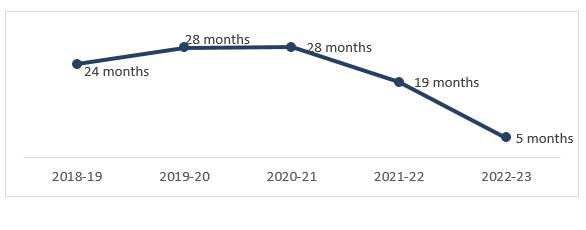
Text Version
|
|
Public Complaints
Top Allegation Categories
This year, the most frequent complaint allegations were:
- Neglect of duty
- Improper attitude
- Improper use of force
- Improper arrest
- Irregularity in procedure
A full list and explanation of the 16 allegation categories is available on the CRCC website.
Of the 4,002 public complaints filed, 2,521 were sent to the RCMP for investigation, while 1,480 did not meet the criteria set out in Part VII of the RCMP Act
Public Complaints – Five-year Trend

Text Version
| 2017-2018 | 2018-2019 | 2019-2020 | 2020-2021 | 2021-2022 | |
|---|---|---|---|---|---|
| Total # of complaints received | 2645 | 2988 | 3641 | 3361 | 3938 |
| Total # of complaints meeting criteria (per section 45.53 of RCMP Act | 2262 | 2352 | 2317 | 2273 | 2573 |
The breakdown by RCMP division is available on the CRCC website.
Complaints that were not sent for investigation may include:
- Complaints from an individual who was not directly involved and/or was not physically present during the incident
- Complaints filed outside the one-year time limit
- Complaints about the conduct of non-RCMP police officers
- Complaints that are trivial, frivolous, vexatious or made in bad faith
- Complaints that are more appropriately dealt with under other Acts of Parliament (e.g. privacy, human rights, official languages)
Of the 4,002 public complaints that were filed, 97% were filed with the CRCC and 3% were filed with the RCMP.
Public Complaints Related to National Security
Section 45.53(4.1) of the RCMP Act states:
The Commission shall refuse to deal with a complaint concerning an activity that is closely related to national security and shall refer such a complaint to the National Security and Intelligence Review Agency (NSIRA).
Public Complaints Referred to the NSIRA

Text Version
- 2019-20: 4
- 2020-21: 2
- 2021-22: 6
- 2033-23: 2
Reviews of the RCMP's Handling of Public Complaints
If an individual is not satisfied with the RCMP's handling of their complaint, they may request that the CRCC conduct a review of the RCMP's investigation.
In 2022-23, the CRCC issued 292 review reports
- 184 Satisfied Reports
- 59 Interim Reports
- 49 Final Reports
In 2022-23, the 292 review reports included:
- 408 findings, of which 208 were adverse
- 192 recommendations
In response, the RCMP accepted approximately:
- 85% of adverse findings
- 84% of recommendations
This acceptance rate is consistent with statistics from the past three years.
Examples of 2022-23 CRCC recommendations are outlined on page 7 of this report.
These review recommendations are classified according to14 categories. Examples of types of recommendations the CRCC can make following the review of a public complaint investigation include:
- RCMP member(s) receive operational guidance from a supervisor
- RCMP issue an apology
- RCMP member(s) receive additional training or review of existing protocol
- RCMP review, amend or establish policy
- RCMP member review the final CRCC report
A description of the 14 review recommendations categories are available on the CRCC website.
Top Five Recommendation Categories for 2022-23

Text Version
| RCMP Member Received Operational guidance | RCMP Issue Apology | RCMP Policy Review/Amendment | RCMP Member Retraining/Protocol Review | RCMP Member Review the Final CRCC Report | |
|---|---|---|---|---|---|
| Number of Recommendations | 78 | 27 | 14 | 19 | 14 |
The CRCC received 234 new requests to review the RCMP's handling of public complaints.
CRCC reports outline which of its findings the RCMP has accepted and what remedial measures the RCMP is taking to address them. The CRCC publishes summaries of these reports to our website.
Strategic Initiatives
Multiple Complaint Subject Member Project
As part of its ongoing effort to hold the RCMP accountable for its activities and the conduct of its members, the CRCC undertook an initial analysis of existing public complaint data. The purpose was to identify RCMP members who were the subject of multiple complaints.
The CRCC's analysis identified 575 RCMP members who were the subject of 5 or more complaints between October 2015 and July 2022.
RCMP Members with 5 or more Complaints
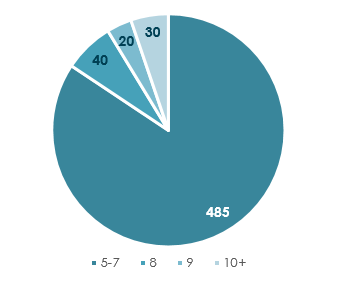
Text Version
- 5-7 complaints: 485 members
- 8 complaints: 40 members
- 9 complaints: 20 members
- 10+ complaints: 30 members
Public Complaint Data FY 2021-22
The CRCC's analysis identified 333 RCMP members who were the subject of 3 or more complaints within one year. For the most part, these complaints were made by different individuals and are connected to separate, unrelated incidents.
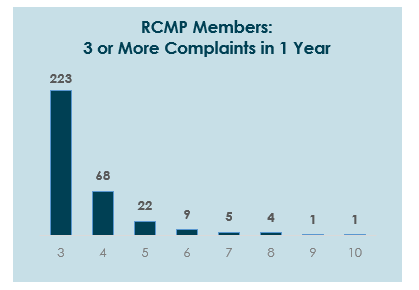
Text Version
RCMP Members: 3 or More Complaints in 1 Year
- 3 complaints: 223 members
- 4 complaints: 68 members
- 5 complaints: 22 members
- 6 complaints: 9 members
- 7 complaints: 5 members
- 8 complaints: 4 members
- 9 complaints: 1 members
- 10 complaints: 1 members
Some noteworthy allegations included:
- Improper attitude and neglect of duty in relation to traffic incidents
- Excessive use of force
- Bias, discrimination and/or racism
- Member conduct in relation to intimate partner violence
- Care of detained persons
Additionally, the CRCC's analysis identified at least 2 public complaints that led the RCMP to initiate its Code of Conduct process. The results of these disciplinary processes are not known at this time.
The CRCC provides Multiple Complaint Subject Member reports to the RCMP annually for its awareness and whatever action deemed necessary.
Bill C-20: An Act establishing the Public Complaints and Review Commission and amending certain Acts and statutory instruments gives the Chairperson the authority to recommend to the RCMP Commissioner that a disciplinary measure be considered for a member who is the subject of more than 1 complaint.
Public Education & Outreach
The CRCC and the RCMP committed to increasing public awareness of the complaint process, as set out in Part VI, section 45.38 of the RCMP Act.
To that end, it was agreed that, Canada-wide:
- CRCC posters would be prominently displayed in public-facing areas of all RCMP detachments; and
- CRCC brochures would be publicly available in all RCMP detachments.
The CRCC and the RCMP's National Public Complaint Directorate coordinated efforts, and currently 676 RCMP detachments across Canada have complied with the joint directive.
Heads of Police Oversight Agencies Annual Meeting
This annual event hosted by the CRCC provided our oversight counterparts with access to experts in the fields of:
- Policing responses to mental health crisis;
- Recent legislative changes and the future of civilian oversight of law enforcement in Canada; and
- The collection and use of disaggregated demographic data in policing oversight.
This meeting further provided a forum to address issues of mutual concern, discuss how to better share information, and collaborate on improving public awareness of the role of police oversight agencies.
Canadian Association of Civilian Oversight of Law Enforcement (CACOLE)
CACOLE is a national non-profit organization involved in the oversight of police officers in Canada. CACOLE is dedicated to advancing the concept, principles and application of civilian oversight of law enforcement throughout Canada and abroad.
As president of CACOLE, the CRCC Chairperson led the 2023 annual conference held in Halifax, Nova Scotia.
Panel discussions addressed topics that included:
- Cultural Implications for the Public Complaint Process & Review Decisions
- Trauma-Informed Investigative Techniques
- Community Policing & Oversight
- Police Interactions with Neurodivergent Individuals
- Challenges for Police Oversight Agencies in Canada
To learn more about CACOLE, please visit the website.
Transparency and Accountability
Public Complaint Reviews: Searchable Findings & Recommendations
CRCC reports outline which of its findings the RCMP has accepted and what remedial measures the RCMP is taking to address them.
In order to promote awareness of the work of the CRCC, and to highlight the remedial nature of the public complaint and review process, the CRCC publishes depersonalized* numbered summaries of reports on its website. These include public complaint review reports where the CRCC:
- is satisfied with the RCMP's handling of a public complaint; or
- has issued recommendations for the RCMP
These summaries can be searched by:
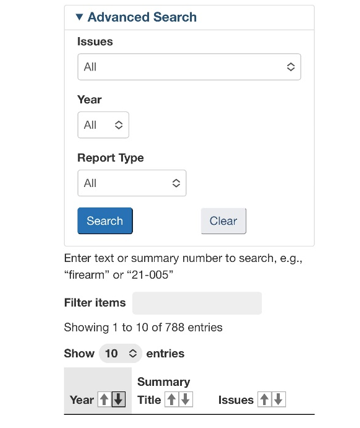
* to protect the privacy of individuals who file complaints
Provincial/Territorial Reports on RCMP Public Complaints
In addition to its annual report to Parliament, the CRCC, per section 45.52(2) of the RCMP Act, is required to submit an annual report to the minister who has primary responsibility for policing in the province or territory, the federal Minister of Public Safety, and the RCMP Commissioner.
The reports must include:
- The number of public complaints filed by RCMP division
- How each complaint allegation was resolved*
- Substantiated by RCMP
- Not Substantiated by RCMP
- Informally Resolved by RCMP
- Terminated by RCMP
- Withdrawn by complainant
- Identification of trends, if any.
Currently, these reports also include a breakdown of the number of:
- Public complaints reviewed by the CRCC;
- The types of recommendations issued; and
- Whether or not the RCMP supported the recommendation.
The reports are published on the CRCC's website.
*Public complaints may contain one or more allegation. A full list of allegations is available on the website.
Administration of the Public Complaint Process
To ensure transparency of the public complaint process, related CRCC policies and agreements are published on the website. These include:
- Policy on the Discretion to Change or Restrict Access to Staff or Services due to Unreasonable Complainant Behaviour
- Policy on the Discretion to Refuse to Deal with a Complaint
- Policy on the Extension of the Time Limit to Submit a Complaint to the CRCC
- Policy on the Closing of Public Complaint due to Incomplete Information
- Memorandum of Understanding between the CRCC and the RCMP
New Intake Policy
To ensure consistency and fairness in the treatment of complainants, the CRCC has implemented a new policy pertaining to the closing of public complaints due to incomplete information. This operational policy came into effect April 1, 2023. This policy enables the CRCC to apply a standardized approach to the intake of complaints that require additional information in order to be processed.
This new policy will not only help alleviate the workloads of our Intake employees by making the process more efficient, but will also make the process more accessible for complainants.
Full details on the new policy are available on our website.
Total Expenditures
| Salaries | 8.9M |
|---|---|
| Operating Costs | 2.3M |
| Employee Benefit Plans | 1.3M |
| Total | 12.5M |
Note: Numbers represented are in millions
Organizational Chart
The CRCC consists of a full-time Chairperson and not more than four other full-time or part-time members, one of whom may be a Vice-chairperson, appointed by the Governor in Council.
A person is not eligible to be a member of the CRCC if that person
- is a member or former member of the RCMP; or
- is not a Canadian citizen or a permanent resident
In 2022-23, the CRCC's senior management team was comprised of:
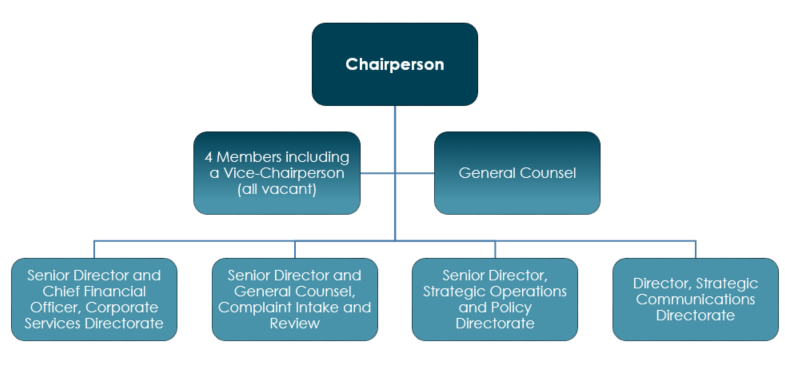
Text Version
- Chairperson
- 4 members including a Vice-Chairperson (on vacant)
- General Counsel
- Senior Director and Chief Financial Officer, Corporate Services Directorate
- Senior Director, Strategic Operations and Policy Directorate
- Director and General Counsel, Reviews Directorate
- Director, Complaint intake Directorate
- Director, Strategic Communications Directorate
- Date modified:

